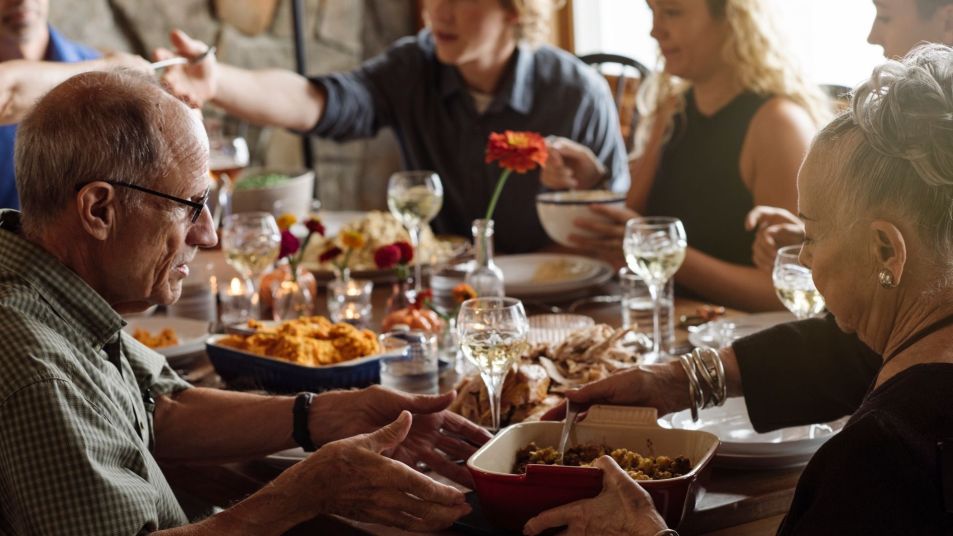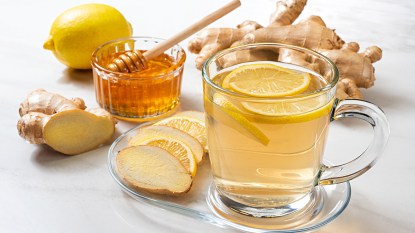Struggling To Feel Grateful This Thanksgiving? Here’s What To Do

You always hear about the power of gratitude, but why is it so darn hard? If you’re struggling to feel grateful this Thanksgiving, don’t beat yourself up. It’s been a stressful couple of years for many of us, and however you’re feeling is perfectly normal. Here, experts share their tips on how to tap into this uplifting emotion.
Forgive yourself.
When you’re just not feeling all that grateful, instead of fighting your emotions, honor where you are, urges Sophia Godkin, Ph.D. Known as “The Happiness Doctor,” Godkin is a health psychologist and an expert on happiness. “There are so many expectations associated with thankfulness, like when we admonish ourselves to ‘just be grateful,’” she says. “But genuine gratitude doesn’t come from pressure, it comes from allowing yourself the freedom to acknowledge all of your feelings without guilt.”
To help you do just that, best-selling inspirational author Max Lucado, author of You Were Made for This Moment: Courage for Today and Hope for Tomorrow (Buy from Amazon, $18) and Teaching Minister of Oak Hills Church in San Antonio, recommends looking to a higher power. “We’re all living through stressful times — there’s no need to add to your stress by beating yourself up,” he says. “Let your lack of gratitude pass through to a higher power and allow yourself to feel forgiven.”
Pause and exhale.
We can’t be grateful for what we don’t notice, which is why mindfulness is the cornerstone of gratitude. And it starts with letting go of should, says Godkin. “Just say to yourself, ‘I know the world is telling me I should be grateful for X, like family, but what I really feel is Y, say, overwhelmed.’” Once you’re honest with yourself, you’ll be able to slow down and effortlessly notice what you’re really grateful for, from the comfy chair you’re sitting on to your cat’s paw on your lap.
Recall the upsides.
“Gratitude has vast benefits, from increasing happiness to deepening sleep — it can even make it easier to eat healthier and save for retirement,” says Laurie Santos, Ph.D, a cognitive scientist and professor of psychology at Yale University. That’s because gratitude boosts long-term problem-solving. “Simply knowing that gratitude is as important as your other healthy habits can be a powerful motivator.”
Sneak in little moments.
Often-recommended “gratitude lists” can sometimes feel burdensome. That’s why Santos suggests sneaking it into your day. “Think about something you’re thankful for while you’re brushing your teeth or putting on your makeup,” she says. In fact, attaching a gratitude practice onto an established routine helps it stick over the long term.
Pass happiness on.
Like joy or a case of the giggles, gratitude is contagious, and spreading it will help it go even deeper within you. “There are people in my life who just infect me with their gratitude,” says Lucado. One such inspiration is a 90-year-old widower. “He recently had to move to a city closer to his children, but rather than complain, he sent me the most beautiful text listing what he’s grateful for, including his kind new neighbors.” It’s a deceptively simple act that triggers a ripple effect of positivity. Encourages Lucado, “Write your worries in sand and carve your blessings in stone.”
Be grateful for you.
Something (or someone) you likely forget when it comes to gratitude? You. “Take time to notice who you are, not the roles you play,” says Godkin. “Gratitude is a transformative practice whose end goal is to make you feel good.” Remembering that every day will send the message at the heart of gratitude: “There is joy in my life and I’m worthy of it.”
A version of this article originally appeared in our print magazine, Woman’s World.













